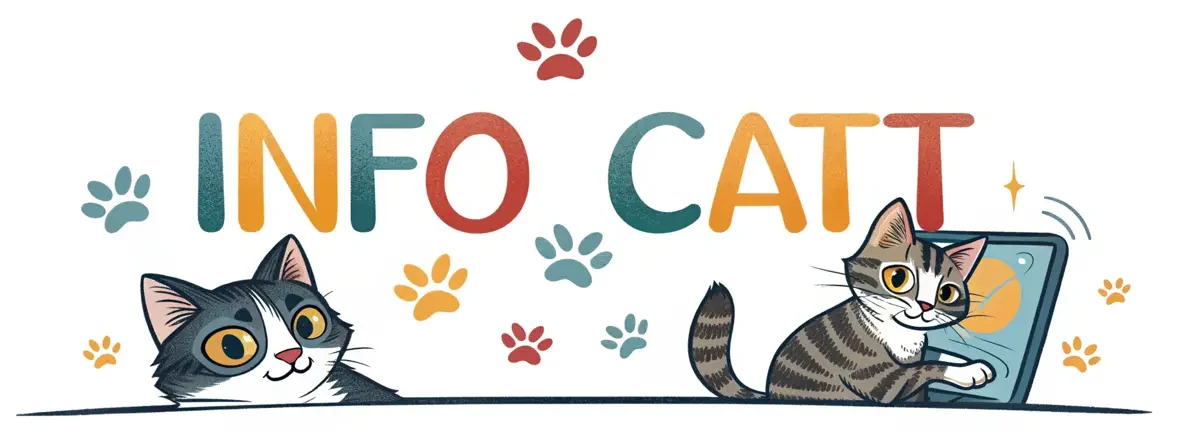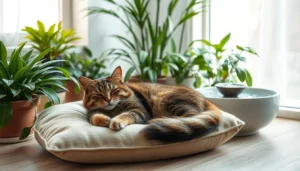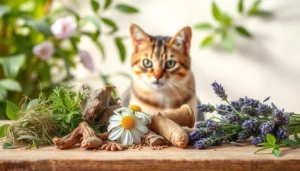Every cat owner has seen their pet show signs of stress. My tabby cat, Whiskers, would shake during thunderstorms. This taught me how vital it is to know how to calm an anxious cat naturally.
Cats, like humans, can feel anxious. While medication is an option, many prefer natural remedies. These home remedies can help without harsh side effects.
Understanding your cat’s feelings is key to helping them relax. Anxiety can be caused by many things, like loud noises or changes. But, it doesn’t have to rule your cat’s life.
Understanding Cat Anxiety: Signs and Triggers
Cats may seem independent, but they can feel a lot of emotional stress. It’s important to know the signs of anxiety in cats to help them feel better. Anxiety can change how your cat acts and feels, affecting their happiness.
Getting to know your cat’s feelings takes careful watching and understanding. Cats show stress in different ways, like changes in how they act or look. If you pay attention, you can spot these signs.
Physical Symptoms of Anxiety in Cats
Stress makes cats’ bodies react in certain ways. Look out for these signs of anxiety:
- Excessive grooming or hair loss
- Sudden changes in appetite
- Unexpected weight fluctuations
- Digestive issues like vomiting or diarrhea
- Dilated pupils
- Trembling or muscle tension
Common Anxiety Triggers for Cats
Many things can stress out your cat. Knowing what triggers their anxiety helps you help them feel better:
- Loud noises (thunderstorms, fireworks)
- New household members or pets
- Changes in living environment
- Disrupted routines
- Veterinary visits
Behavioral Changes to Watch For
Spotting changes in your cat’s behavior is key to helping them. Look out for these signs of anxiety:
- Increased aggression or hiding
- Excessive vocalization
- Litter box avoidance
- Clingy or withdrawn behavior
- Destructive actions
“Cats are masters of hiding their emotions, making it essential for owners to be observant and empathetic.” – Feline Behavioral Specialist
Knowing these signs helps you support your cat’s health. You can make their environment more comfortable.
How to Calm an Anxious Cat Naturally: Essential Tips and Techniques
Reducing cat stress naturally needs a gentle and patient approach. Cats are very sensitive and need special care when they’re anxious. Learning how to ease cat anxiety without medication can make your home more peaceful for your cat.
Here are some effective natural ways to relax a cat:
- Create a calm sanctuary – Designate a quiet space where your cat can retreat and feel secure
- Use pheromone diffusers to simulate calming signals
- Establish consistent daily routines
- Provide vertical spaces like cat trees for security
Gentle handling is key in reducing cat stress naturally. Move slowly and avoid sudden movements. Speak softly to help them feel safe. Some cats prefer not to be touched when they’re anxious, so respect their space.
Patience is key when helping an anxious cat feel comfortable and secure.
Interactive play is a great way to ease cat anxiety without medication. Play with your cat using toys that mimic hunting. Short, frequent play sessions can help them feel more confident and calm.
- Use wand toys for interactive play
- Rotate toys to maintain interest
- Schedule playtime during calm periods
Remember, every cat is different. What works for one might not work for another. Be ready to try different natural relaxation techniques.
Creating a Safe and Calming Environment for Your Cat
Making your cat feel safe at home is key to reducing anxiety and improving their well-being. Cats are sensitive and need special spaces to feel secure and comfortable. By creating a calming environment, you can help your nervous cat feel more relaxed and protected.
To create a stress-free home for your cat, follow several important strategies. These strategies address their natural instincts and need for security. The right approach can turn your home into a sanctuary where your scared or nervous cat feels truly at ease.
👉 Setting Up Quiet Zones
Cats need special spaces to retreat and feel safe. Here are some tips to create these calming areas:
- Choose elevated locations like high shelves or cat trees
- Provide soft, enclosed spaces like covered beds or cardboard boxes
- Place quiet zones away from high-traffic areas
- Use comfortable bedding that feels secure and warm
👉 Optimizing Your Cat’s Territory
Understanding your cat’s territorial needs is crucial for helping a scared or nervous cat feel more confident. Vertical spaces and multiple hiding spots can reduce anxiety by giving your cat control over their environment.
- Install cat shelves and climbing structures
- Create multiple resting areas throughout your home
- Use cat-friendly furniture that provides hiding spots
- Ensure each area has access to essentials like water and litter box
👉 Using Sound and Light Management
Calming techniques for cats often involve controlling environmental stimuli. Minimizing loud noises and harsh lighting can help create a soothing atmosphere for your anxious pet.
- Use soft, dim lighting in rest areas
- Play gentle background music or white noise
- Avoid sudden loud sounds
- Consider blackout curtains for sensitive cats
Natural Herbs and Supplements for Cat Anxiety Relief
Helping your anxious cat find relief doesn’t always need prescription meds. Natural remedies can be very effective in managing your cat’s stress and anxiety. Vets suggest several safe and effective options for natural remedies.
Some of the most effective natural solutions for calming treats for cats include:
- Chamomile: A gentle herb known for its soothing properties
- Valerian root: Helps reduce nervous tension
- L-theanine: An amino acid that promotes relaxation
Essential oils safe for cats anxiety require extreme caution. Most essential oils are toxic to cats. It’s crucial to consult with your vet before using any aromatherapy. Some cat-friendly alternatives include:
- Catnip-based calming supplements
- Bach flower remedies
- CBD oil specially formulated for pets
“Always prioritize your cat’s safety by consulting a professional before introducing any new supplements.” – Veterinary Anxiety Experts
When selecting natural remedies, choose high-quality products made for cats. Avoid human supplements, as they may harm your cat. Start with small doses and watch your cat’s response carefully.
Remember, natural supplements work best with environmental enrichment and stress-reduction techniques. Your vet can give you personalized advice for your cat’s anxiety needs.
Calming Through Touch: Massage and Acupressure Points
Touch can be a powerful tool to calm an anxious cat naturally. Cats often feel secure and relaxed with gentle, strategic physical contact. Knowing the right calming techniques can change how you comfort a stressed cat.
Gentle touch therapy is a natural way to soothe your cat’s nervous system. By learning specific petting techniques and understanding your cat’s body language, you can create a calming experience.
Effective Petting Techniques
- Use slow, gentle strokes along the cat’s back
- Pay attention to your cat’s reaction and body language
- Start with light touches and gradually increase pressure
- Avoid sudden movements that might startle your cat
Key Pressure Points for Relaxation
Cats have specific areas that respond well to gentle pressure and can help reduce anxiety:
- Base of the tail: Gentle scratching can release tension
- Behind the ears: Soft circular motions promote relaxation
- Cheeks and chin: Light stroking can help calm nervous cats
Duration and Frequency of Touch Therapy
When learning how to comfort a stressed cat, timing is crucial. Short, consistent sessions work best. Aim for 5-10 minute gentle massage periods, 2-3 times daily. Watch your cat’s body language to understand their comfort level and adjust.
Remember, every cat is unique. What works for one might not work for another, so patience and observation are key.
Diet and Nutrition’s Role in Reducing Cat Anxiety
It’s important to know how diet affects your cat’s mood. Good nutrition is key to managing stress and keeping your pet’s mind healthy.
To naturally reduce cat stress, try these dietary tips:
- Choose high-quality protein sources that support brain health
- Incorporate omega-3 fatty acids to help calm nervous systems
- Select foods with balanced nutrients that promote emotional stability
Some nutrients can really help with your cat’s anxiety. Tryptophan-rich foods boost serotonin, which helps with mood. Probiotics also support gut health, which is linked to feeling good emotionally.
Slowly changing your cat’s diet can help. Talk to your vet to create a diet plan that fits your cat’s needs.
Proper nutrition is a powerful tool in managing feline anxiety and promoting overall emotional balance.
Focus on these key nutrients:
- Vitamin B complex for stress management
- Magnesium to support relaxation
- Amino acids that support neurotransmitter production
Every cat is different. What works for one might not work for another. So, be patient and get professional help to find the right nutrition for your anxious cat.
Environmental Enrichment and Stress-Relief Activities
Creating a calm space for your anxious cat is key. DIY solutions focus on fun and engaging activities. These help reduce stress and boost confidence.
Cats need both mental and physical challenges to fight anxiety. By learning how to ease their stress, you can turn your home into a cozy haven. It’s a place where they can play and feel safe.
👉 Interactive Play Sessions
Playtime is a great way to channel your cat’s nervous energy. Here are some tips to help a scared or nervous cat:
- Use wand toys that mimic prey movement
- Schedule consistent daily play times
- Rotate toys to maintain interest
- Create short, high-energy play bursts
👉 Cognitive Stimulation Games
Mental games can really help with feline anxiety. Puzzle feeders and interactive toys are great for keeping minds sharp:
- Treat-dispensing balls
- Hidden treat games
- Cat tunnel obstacle courses
- Laser pointer chase sessions
👉 Natural Stress-Relief Toys
Choose toys that offer comfort and security. Soft textured items and those with calming scents can greatly improve your cat’s mood.
“A mentally stimulated cat is a calmer cat.” – Veterinary Behavioral Specialists
Every cat is different. Try various activities to find what works best for your cat’s anxiety.
Conclusion
Learning to calm an anxious cat naturally takes patience and understanding. Each cat is different, so finding the right solution may take time. Your effort to find natural ways to relax your cat can greatly improve their emotional health.
We’ve talked about many ways to manage cat anxiety. You can create a safe space, use gentle touch, and make dietary changes. Adding environmental enrichment is also helpful. Remember, being consistent is crucial when using these methods.
Your commitment to your cat’s emotional health is amazing. By being compassionate and holistic, you can make your cat feel safer and happier. Stay patient, watch how your cat reacts, and seek vet advice if needed.
Your love for your cat is truly special. By trying natural solutions, you show how much you care. With patience and the right approach, you can help your cat live a happier, more peaceful life.
FAQ
How can I tell if my cat is experiencing anxiety?
Look for signs like excessive grooming and hiding. Also, watch for sudden aggression and changes in appetite. Your cat might vocalize more or have trouble with the litter box.
They could also show physical signs like dilated pupils or trembling. Excessive shedding is another sign of stress.
Are there any natural herbs that can help calm an anxious cat?
Yes, herbs like chamomile, valerian root, and catnip can help. But, always check with your vet first. This ensures they’re safe for your cat.
How can I create a calming environment for my anxious cat?
Make quiet zones in your home for your cat. Use pheromone diffusers and provide vertical spaces like cat trees. Maintain a regular routine and avoid loud noises.
Make sure your cat has safe spots to hide and comfortable places to rest.
Can diet help reduce my cat’s anxiety?
Yes, a balanced diet with omega-3 fatty acids and high-quality proteins is good. Adding probiotics and proper nutrition can help manage stress.
What are some natural ways to comfort an anxious cat?
Try gentle massage and soft speaking. Use calming touch therapy and interactive play. Create a predictable routine and use positive reinforcement.
Spending quality time and being patient can really help reduce anxiety.
Are there any safe essential oils for cat anxiety?
Be very careful with essential oils. Many are toxic to cats. Only use pet-safe products for cats, and always check with your vet first.
Never apply essential oils directly to your cat or in areas where they sit or sleep.
How long does it take to see improvements in my cat’s anxiety?
It varies, but you might see improvements in a few weeks. Be patient and consistent. If anxiety doesn’t get better, talk to your vet.
Can stress-relief toys help reduce my cat’s anxiety?
Yes! Toys like interactive ones, puzzle feeders, and scratching posts can help. Toys that mimic hunting can be very effective in reducing stress.
Is my cat’s anxiety a permanent condition?
Not always. With the right approach, many cats can improve their anxiety. This includes environmental changes, natural remedies, and professional help.
When should I consider professional help for my cat’s anxiety?
If your cat’s anxiety is severe or doesn’t improve, seek help. A vet or veterinary behaviorist can offer advice and specialized treatment.



